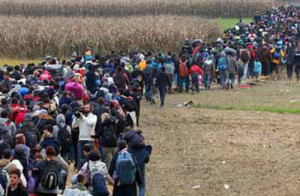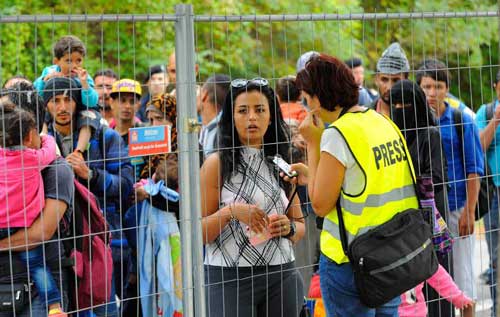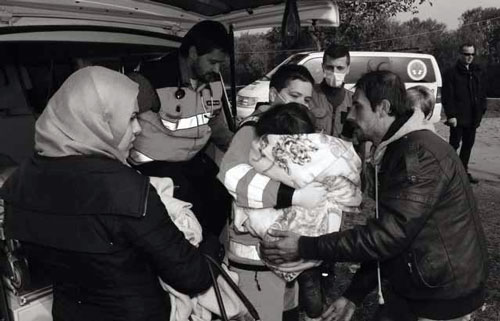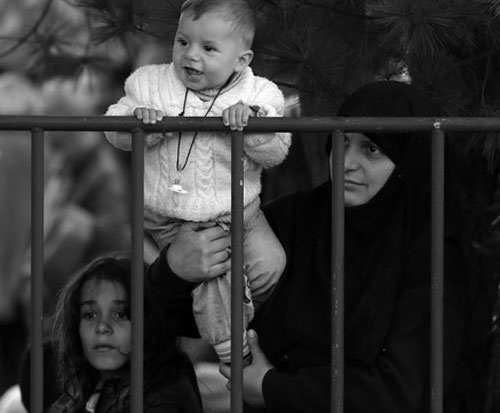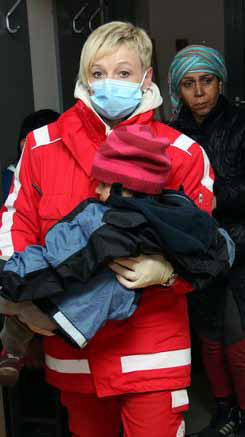They headed to a long and dangerous path to Europe, the “Promised Land”. Their desire was to live a peaceful and dignifying life. By the time refugees and migrants crossed Slovenia, they had already travelled 3000 km on their long and difficult journey. We visited one of the largest refugee centers to inquire about their health. We had a brief conversation with the Head of the health care, Mojca Pibernik, MD, a specialist in family medicine.In a few months, over 400 000 migrants have entered Slovenia.
What are the most common health problems of refugees?
The most common problems we come across are respiratory infections, diarrhoea, dehydration, and hypothermia. We have also encountered more exotic cases such as thalassemia major, also known as Cooley’s anaemia, which is rare in Slovenia. It was very brave of them to travel such a distance with such child. He was given transfusion and his haemoglobin levels were checked. We saw some terminal cancer patients for whom we provided analgesic therapy, and a few cases of severe bedsores. Then there were two brothers, one was hospitalised in the hospital of Brežice and treated for his wound and underwent surgery, while the younger sibling was taken by child protective services and accommodated in the safe house. Our priority was to keep families together, even though it proved extremely difficult at times, due to overcrowding. We provided dry clothing for children and even changed diapers for the youngest among them. In general, I would say that considering the length and duration of their journey, they have proven to be a very tough and healthy population.
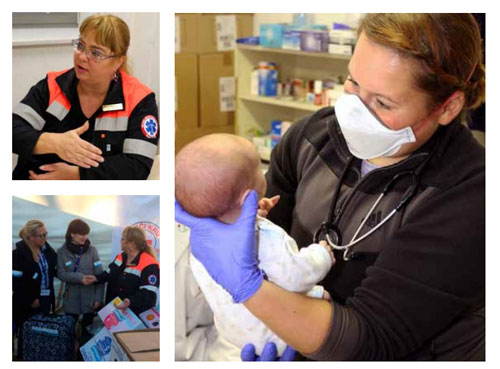
Have there been any cases of childbirth?
Yes, we have had a few. They were all born healthy and were released quite quickly, so I could say we have new inhabitants as well (laughter).
Were you prepared for the situation? How did you organise everything?
I cannot say that we were prepared for the situation, but the emergency medical unit in Slovenia has to follow precise guidelines for large-scale disasters, natural catastrophes, so we knew how to organise everything. Through the Ministry of Health, we activated commodity reserves so we could provide medication, sanitary supplies, and medical devices. Some of them also ordered and shipped directly from a pharmacy. Furthermore, we used our mobile trauma surgical facility, and cooperated with the Slovenian Red Cross, Caritas Slovenia, Civil Protection Services, Administration for Civil Protection and Disaster Relief, and foreign organisations and offices. We received a lot of help throughout the process from everyone. The police department in Brežice let us use their premises for a temporary clinic; safety barriers surrounding the area provided the necessary privacy to show respect for a different culture.
Only when we came upon a wave of refugees that exceeded all our capacities and capabilities, it became evident how well we were organized. The maximum capacity was for 450 refugees only, but there were up to 13,000 in Brežice staying at five different locations. Throughout their stay, we made sure they had enough to eat and drink, and supplied them with blankets. We succeeded and are very proud of it.
What was the response of Slovenia and Slovenian volunteers?
We Slovenians are known throughout Europe for our good-natured soul. We are good people, and, historically speaking, this went against us. I would like to express my surprise of how well people responded to our aid, mostly those involved with non-governmental and voluntary organisations as well as individuals. They immediately jumped to help with whatever the refugees needed, from food to clothes.
What was the most endearing?
It’s incredible and very brave to set out on such a long journey with small children or in high pregnancy. Conditions at home must be horrific to choose something so dangerous. However, I started to wonder where this leads and what made them choose Europe. But all in all, I wish them luck on their journey, here or there, and peace in the world. After the interview, we drove with doctor Pibernik to Dobrova and gave some humanitary packages for refugee women and their children. We wish them luck on their way. We provided for them as we provide for our patients.
The Slovenian Red Cross helps migrants in reception and accommodation centres around Slovenia.
Since mid-October 2015, they have helped more than 20,000 migrants when they have suffered from cold, fatigue, bruising, blisters, indigestion, headache, sore throats or inflamed bottoms. They have acted in lifethreatening situations where resuscitation was needed, and resolved acute conditions, unconscious states and hypothermia. They have resuscitated several people, including a baby girl only a few months old. Each reception and accommodation centre has hosted a Red Cross team. “We relieve suffering and encourage human dignity and tolerance. Our activities strive to meet the needs of vulnerable groups, irrespective of their nationality, race, religious belief, social class, political opinion or legal status. We address their vulnerability in an integral manner. We do all we can to help and contribute to protecting vulnerable people, both by providing humanitarian aid for their pressing needs and by searching for sustainable solutions.”
THE EXPERIENCE OF VOLUNTEER WORK
at the Refugee Centre at Šentilj
The day began with my coordinator’s confirmation that I am needed at the refugee accommodation centre at Šentilj. I was overwhelmed with emotions when I received the good news. I became aware that this was something different than folding clothes in donation centres and that I would be able to meet the refugees face to face. I had been moved by their hardship without being in personal contact with them. I registered and walked into the tent where volunteers are handing out the necessary clothing to refugees. That was the first time I looked into their eyes. I was expecting to see a difficult and sad picture but I saw sparkling, joyful, grateful and happy eyes of people who were on their way to a better life. They were tired, hungry, dirty, ragged, many of them ill, but cheerful and happy nevertheless. You can’t resist to smile heartily with them. And the children were so beautiful. Patient, spirited, adorable. Their eyes sparkled when they got a fresh pair of socks and a warm sweater. Many of them came and patiently waited in long queues to receive clothes. Children were crawling out of tents like little snails. A child often found comfort in the lap of volunteers. When their mothers were trying on coats, they handed their babies and toddlers to the volunteers, who took them in their loving arms without any concerns for their health. There was a tight connection between us all. Our most important tool was our smile, and our most important mission was to be close to people. The refugees felt the same way. A mother dressed in a black cloak with the veil over her face approached me. She revealed her face to me when she wanted to tell me what her children needed. That is how we could create a stronger bond and communicate easier. Soldiers also played their part in creating a pleasant atmosphere. They lovingly dressed the children in front of the tent, cuddled them and played with them. It is funny to see an armed soldier looking for a suitable cap for a baby and instructing us to immediately find a toy for this child. We were handing out food to children, such as milk and cookies, a bottle of water, an apple, a can of fish, bread and a cheese triangle. Although we were instructed to give out only one portion of food, the volunteers were generous. There were heated tents with bunk beds available for the refugees. Toilets and medical care were also available. Our wonderful soldiers were also the reason for a cosy atmosphere. The soldiers were associating with children, played with them, cuddled with them and dressed them. They had a respectful attitude towards refugees. It is really funny to see armed soldiers looking for a suitable cap for the infant and requiring from us to immediately find a toy that the child needed. In general, it was all very efficient and wellmanaged, protected and organized. After a long day, when I was heading home in the evening, I ran into worried parents of a sick baby. I offered to accompany them to the medical tent to see a doctor, with military escort as required, and then back to their tent. For some time, I accompanied the sick, hanged out with them, comforted them and cradled their children. I learned some Arabic words but mostly I chatted with the refugees, mostly concerned mothers of sick children, using my hands and some English words. Although I was tired and drained, I found it difficult to say goodbye because I knew that I would probably never see these people again. Therefore, we wished each other all the best, good luck and thanked each other for this encounter that seemed like a present to us.
The Slovenian Red Cross helps migrants in reception and accommodation centres around Slovenia.
Since mid-October 2015, they have helped more than 20,000 migrants when they have suffered from cold, fatigue, bruising, blisters, indigestion, headache, sore throats or inflamed bottoms. They have acted in lifethreatening situations where resuscitation was needed, and resolved acute conditions, unconscious states and hypothermia. They have resuscitated several people, including a baby girl only a few months old. Each reception and accommodation centre has hosted a Red Cross team. “We relieve suffering and encourage human dignity and tolerance. Our activities strive to meet the needs of vulnerable groups, irrespective of their nationality, race, religious belief, social class, political opinion or legal status. We address their vulnerability in an integral manner. We do all we can to help and contribute to protecting vulnerable people, both by providing humanitarian aid for their pressing needs and by searching for sustainable solutions.

